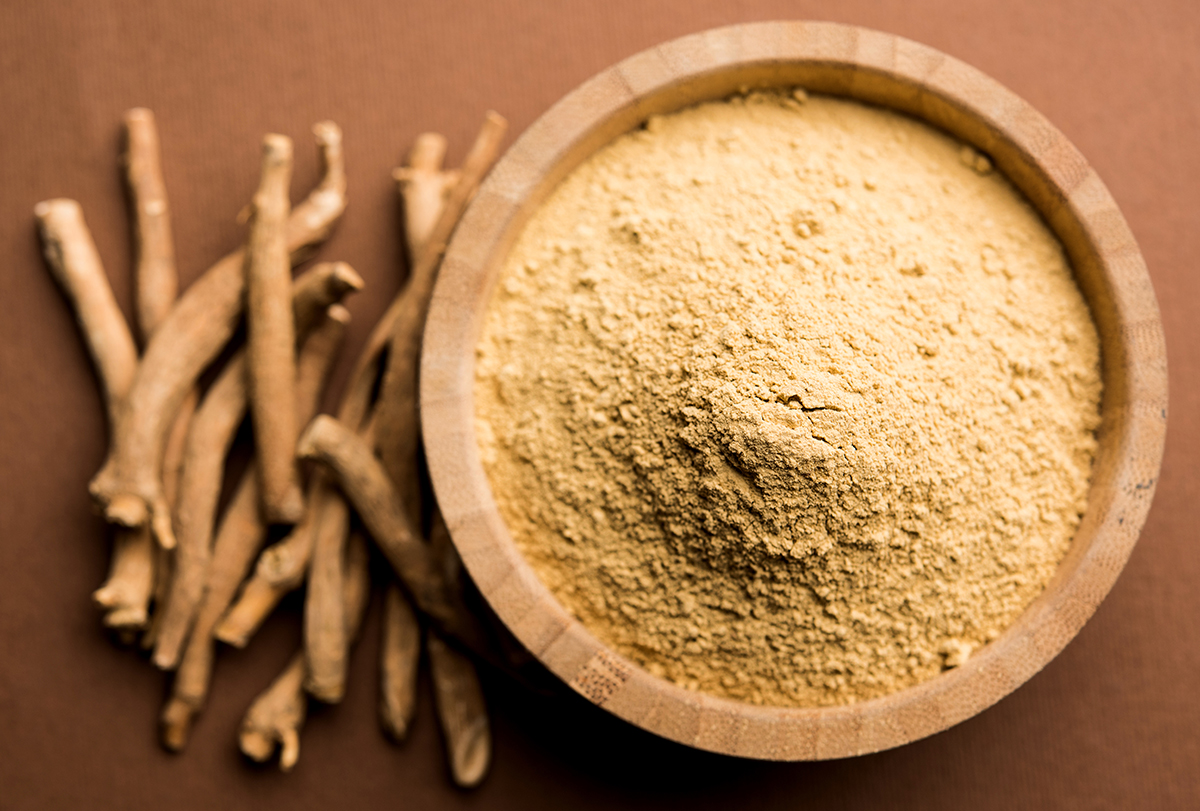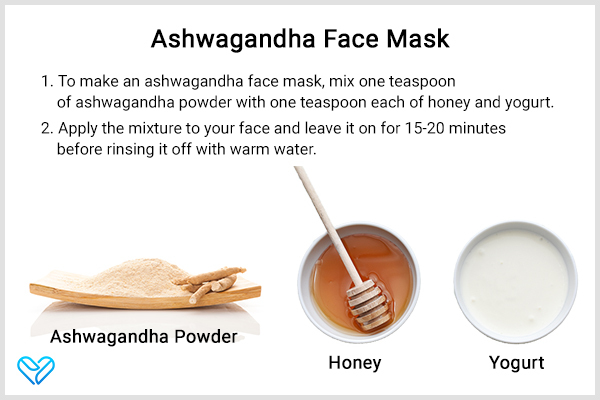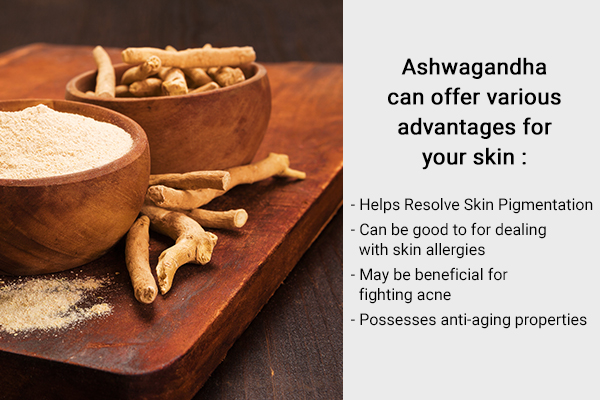In this article:
Ashwagandha (Withania somnifera) is an Ayurvedic herb that has been utilized for years in traditional medicine to treat a variety of ailments.

In recent years, ashwagandha has gained popularity in the skin care industry due to its anti-inflammatory and antioxidant activities. Applying ashwagandha topically to the face has been shown to improve the appearance of the skin and reduce the signs of aging. (1)
In this article, you will learn how to apply ashwagandha to your face and its benefits.
How to Apply Ashwagandha to Your Face
There are several ways to apply ashwagandha topically to the face. Here are a few methods.
1. Use ashwagandha water extract
- Cleanse your face with a gentle face wash and dry it with a towel.
- Combine a tiny amount of ashwagandha powder and water to form a paste. Generally, a teaspoon of powder mixed with a tablespoon of water will suffice.
- Boil some water and steam the paste for 10–15 minutes.
- Let the paste cool down.
- Use a clean cotton ball or pad to apply the paste to your face. Massage it well in circular motions.
- Leave it on your face for 30 minutes or at least till it dries.
- Rinse it off with water and pat your skin dry with a towel.
2. Apply ashwagandha face mask

- Mix 1 teaspoon of ashwagandha powder with 1 teaspoon of honey and yogurt.
- Apply the mixture to your skin and leave it on for 15 minutes.
- Wash it off with water.
Honey possesses inherent antibacterial characteristics that can prevent acne. It also functions as a natural humectant, which retains moisture in the skin without obstructing the pores.
Furthermore, honey comprises anti-inflammatory and antioxidant components that diminish inflammation and alleviate skin irritation.
So, honey and ashwagandha masks can be good for the skin! (2)(3)(4)
3. Try ashwagandha oil
- Combine 1 tablespoon of ashwagandha powder with 1 cup of carrier oil, such as coconut oil or almond oil.
- Heat the mixture, and then strain out the ashwagandha powder.
- Apply the oil to your face before bed and leave it on overnight.
Ashwagandha oil can be used as a moisturizer on its own or combined with other skin care products.
What Is Ashwagandha?
Ashwagandha (Withania somnifera) is a prominent herb used in Ayurvedic medicine, a traditional healing system developed in India thousands of years ago.
Ashwagandha has been used as a “rasayana” or rejuvenator in Ayurveda, which refers to herbs or formulations that are used to promote physical and mental health, improve longevity, and enhance the quality of life.
Ashwagandha is used for a variety of purposes, including stress relief. It is known as an adaptogen, meaning it assists the body in coping with stress. Researchers have revealed that ashwagandha can reduce cortisol levels in the body, which is a hormone that is produced when you’re stressed.
Moreover, ashwagandha has been found to enhance immunity by increasing white blood cell production. It has also been found to have anti-inflammatory activity, which can help decrease inflammatory responses in the body.
Ashwagandha can be taken in different forms such as capsules, powders, and teas, and it is generally considered safe for most people. However, as with any supplement, it is crucial to confer with your doctor before taking ashwagandha. (5)
Ashwagandha for Skin Health
Ashwagandha contains compounds called withanolides, which have been shown to have anti-inflammatory and antioxidant properties. These compounds can help safeguard the skin from damage caused by environmental factors such as UV rays and pollutants. (6)
Incorporating ashwagandha into your daily skin care regimen can offer various advantages for your skin.

1. Helps resolve skin pigmentation
One study looked at how ashwagandha could help with pigmentation on the skin.
The study found that ashwagandha extract (WSE) interrupted a signaling pathway that leads to the upregulation of MITF, which is a protein that controls the production of melanin, the pigment that gives color to the skin. The study also showed that the WSE did not have a toxic effect on melanocytes, which are the cells that produce melanin.
These results suggested that the depigmenting effect of the WSE is not due to the death of melanocytes, but rather to the interruption of a signaling pathway that leads to the production of melanin.
Overall, these findings suggested that ashwagandha extract may be a promising natural ingredient for treating pigmentation disorders of the skin. (7)
2. Can improve skin allergies
According to research, many skin conditions related to inflammation, such as allergic contact dermatitis, psoriasis, and atopic dermatitis, are linked to the function of keratinocytes and cytokines.
Keratinocytes are responsible for producing inflammatory mediators, which can lead to an abnormal inflammatory response when overproduced. Therefore, it’s important to find potential anti-inflammatory agents that can suppress these pro-inflammatory mediators.
One solution that has been studied is ashwagandha. Researchers have found that ashwagandha has anti-inflammatory and wound-healing activities. (8)
3. May fight acne
A study published in the Journal of Pharmaceutical Sciences and Innovation explored the use of an anti-acne cream containing ashwagandha extract. The researchers concluded that the cream was useful in decreasing acne lesions and enhancing skin health.
The ashwagandha extract used in the cream was found to have anti-inflammatory and antioxidant properties, which can help reduce inflammation and oxidative stress that contribute to acne.
Additionally, the extract reduced the levels of sebum, the oily substance that can clog hair follicles and cause acne.
Overall, the study suggested that ashwagandha may be a promising ingredient in anti-acne creams and other skin care products. (9)
4. Fights signs of aging
Telomerase is an enzyme responsible for maintaining the length of telomeres, which are protecting caps on the chromosomes. Telomeres compress with age, and this shortening is linked with aging and age-related disorders.
A study found that treatment with ashwagandha root extract increased telomerase activity in human HeLa cells. This means that the extract may have antiaging properties by helping to maintain the length of telomeres.
While the study did not specifically look at the effects of ashwagandha on skin aging, it is possible that the antiaging effects observed in the study could also apply to the skin. (1)(10)
Most-Asked Questions About Ashwagandha for Skin
How often should I use ashwagandha on my face?
The frequency of using ashwagandha on the face depends on the product you are using and your skin type.
Can ashwagandha be used on sensitive skin?
Yes, ashwagandha can be used on sensitive skin. However, it is important to perform a patch test before using any new product, as advised by dermatologists.
Final Word
Ashwagandha is a natural and useful ingredient for enhancing the health of your skin. Whether you choose to use it in a face mask, oil, or toner, incorporating ashwagandha into your skin care routine can help safeguard your skin from environmental damage and lessen the indications of aging.
With the scientific evidence supporting its benefits, ashwagandha is a valuable addition to any skin care regimen.
- Was this article helpful?
- YES, THANKS!NOT REALLY


